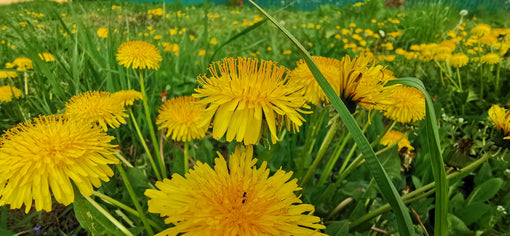
- Article published at:
- Article author: Web Dev
- Article tag: beeswax
- Article comments count: 0
Two weeks are left in this glorious spring month and we want to talk a little more about how not mowing your lawn, for just one month, can really allow the wildflowers to bloom, which in turn will support the bee, and other pollinator, population.
Here in CT, the buzz of lawnmowers is a weekly thing! Whether you mow it yourself or hire a service, the lawns in our state are generally well maintained and have the appearance of a freshly groomed golf course. But, what happens to the first spring flowers such as dandelion, red clover, violets, grape hyacinth, to name a few? Well, they get mowed over, that’s what!
By holding off on mowing, even for these last two weeks in May, you’d save some time and some money, as well as the amazing natural resources that pollinators depend on.
In the UK, The original Plantlife No Mow May campaign (Every Flower Counts) discovered that 80% of lawns left wild supported approximately 400 bees a day. 20% of the un-mown lawns were supporting 10 times that number of bees! We’re still blown away by those numbers.
Now on to the Big 4!
First great reason for postponing mowing until June:
A pause from mowing will give the wildflowers a chance to bloom and in turn nourish the bee population with a wider selection of nectar. The more wild flowers you have blooming on your lawn, the more types of pollen and nectar they will produce. It’s a win-win situation.
Second reason to let the lawn grow wild:
Reports show that the highest number of wildflowers, and production of nectar sugar, was found on lawns that were mowed just once a month, or every four weeks. That’s great news and a very easy way to diversify your lawns. Once you see what pops up in the unmoved areas of your lawn, you might want to permanently designate an area as a no mow zone and nurture it as a wildflower garden.
The third reason to put the biggest lawn chore on hold for just a little longer:
Allowing your lawn to rest, and thrive naturally, even for a few scant weeks, actually drives up local bee populations and bee diversity! Makes sense right? More abundant pollen-rich sources means more bees coming to the party. (And they’ll bring some friends!)
And the fourth and last reason to give yourself and the bees a break this May:
Okay, this is two reasons combined into one. You will either save the actual time of mowing (and we all know what a CHORE that is, OR you will save the cost of one or two weeks of hiring a lawn service. Spend that time and money on yourself and your family. A surprise treat for everyone involved right?
Bonus reason:
A reduction in noise pollution! Many neighborhoods are buzzing so loudly with lawn mowers that you can hardly hear the birds chirping and the bees buzzing. A quiet weekend would be so welcomed!
Finding it very hard to end this blog post because… we have one more bonus BONUS reason for letting those wildflowers thrive:
You can make some amazing recipes from dandelions. Check out this blog post and get creative with this very heart-healthy plant.
We’ve also consistently sectioned off a portion of our yard and designated it as a No Mow Zone! We think our little bees are thanking us. :)
Check back here or visit us on Instagram or Facebook for updates.
As we mentioned in our prior #NoMowMay blog post from May 2020, bees are the livelihood of Little Bee of CT and so many other loyal beekeepers around the world. Without these busy, magnificent creatures, approximately one-third of our food supply would be jeopardized due to lack of cross-pollination. Don’t forget…not only do bees pollinate the food we eat directly, they also pollinate the wild plants, flowers, and clover used to feed the livestock our country depends on for meat. The pollination cycle is vast and has long-reaching implications if it’s interrupted.
Please share your results with us by mentioning us in your Instagram posts, or by sending us a message on Facebook. We’d love to see your photos and will choose our favorite to share on our social channels in June!
Thanks for supporting the bees and for supporting Little Bee of CT. Visit our site to learn more about our company and our products.
Learn More
